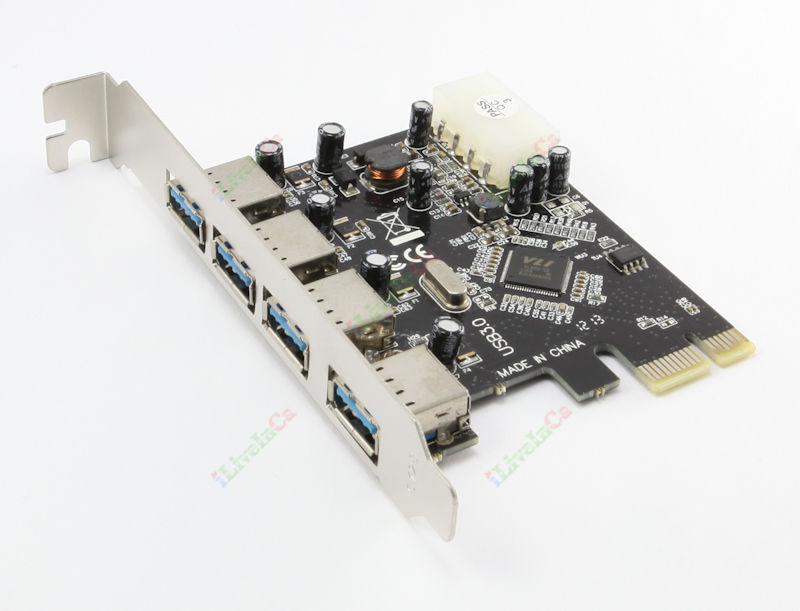USB 3.0 PCI x1 Card Review VIA VL805 on Linux Review and Experience

This is a VIA made VL805 USB 3.0 Chipset with 4-ports and MOLEX powered. First of all this unit was cheap at about only 9 USD with fast shipping. My biggest concern was if this was a quality unit and would it really give you full USB 3.0 speeds (some people reported with similar cards that for some weird reason they were only getting 50MB/s perhaps they were not using a fast enough device).
lspci from Linux output:
0000:05:00.0 USB controller: VIA Technologies, Inc. VL805 USB 3.0 Host Controller (rev 01)
In my case I was using a Seagate 8TB USB 3.0 drive, the maximum speed is about 184-185 MB/s and I was able to achieve this speed over this USB 3.0 card just fine. This is a nice upgrade considering with USB 2.0 I was only getting 39MB/s before!
Performance
sudo dd if=/dev/sdd of=/dev/null bs=1M count=5000 skip=15000
5000+0 records in
5000+0 records out
5242880000 bytes (5.2 GB) copied, 27.6761 s, 189 MB/s
*Update here is a test on an ADATA 256GB SSD (normally it is around 500MB/s when plugged in as SATA).
197MB/s is fairly disappointing but I am not sure if the USB to SATA adapter enclosure is the issue or not. However this system is running PCI 1.1 which may be part of the issue. I believe this is a X1 card and that would limit the speed to 200MB/s I believe (which is basically the result we see).
sudo dd if=/dev/sde of=/dev/null bs=1M count=5000
5000+0 records in
5000+0 records out
5242880000 bytes (5.2 GB) copied, 26.6155 s, 197 MB/s
I actually confirmed it that this X1 card is limited to 200MB/s. The way I tested was to take both USB 3.0 drives connected to it and do a dd (we know the speed results alone are 189MB/s and 197MB/s separately).
However when doing both drives at once they both get about 100MB/s each proving the available bandwidth is just 200MB/s total.
5000+0 records in
5000+0 records out
5242880000 bytes (5.2 GB) copied, 49.4117 s, 106 MB/s
5000+0 records in
5000+0 records out
5242880000 bytes (5.2 GB) copied, 51.2366 s, 102 MB/s
[1]- Done sudo dd if=/dev/sde of=/dev/null bs=1M count=5000 skip=10000
[2]+ Done sudo dd if=/dev/sdd of=/dev/null bs=1M count=5000
Value
Excellent value for just $9 USD shipped you get an instant 4-port upgrade with USB 3.0 ports.
I just realized this but you can pay about $13 to order a USB 3.1 (10gbit) card from China vs the $9 USD within North America option. The USB 3.1 card from China also has SATA power and an internal USB port which is nice.
Honestly if I could wait I would have done this but is it a big deal? Not really because devices I have do not exceed the 5gbit bandwidth.
Pros/Cons
Others have complained about this, I was very nervous I would break the MOLEX connector off the board. Molex connectors usually don't go in easily, I was very careful to try an hold the connector on the board in place while shoving in the molex power connector but even then I was worried I would break it off. Some have complained of this issue. I am not sure if the power is needed but would assume definitely for powered devices like HDDs it will help.
I wish this were a x4 Card as this would have given 800MB/s of bandwidth instead.
Conclusion
This is a solid and reilable buy with a VIA chipset and a quick, cheap and easy way to get USB 3.0 ports especially if you have none or just need more!
Tags:
usb, pci, via, vl, linux, chipset, ports, molex, powered, usd, shipping, speeds, reported, mb, lspci, output, controller, technologies, inc, rev, seagate, tb, maximum, achieve, upgrade, sudo, dd, dev, sdd, null, bs, bytes, gb, copied, update, adata, ssd, plugged, sata, disappointing, adapter, enclosure, sde, limited, separately, proving, bandwidth, haven, extensive, gbit, spec, shipped, vs, devices, exceed, pros, cons, complained, connector, connectors, shoving, hdds, reilable,
